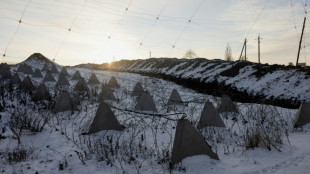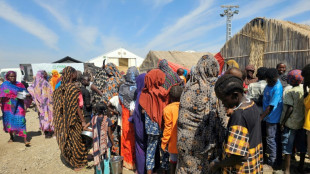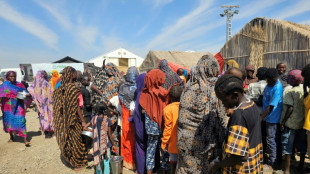
-
 Townsend expects recalled Scotland duo to shine in Six Nations clash with Wales
Townsend expects recalled Scotland duo to shine in Six Nations clash with Wales
-
Peru's new president under fire for child sex comments

-
 UK king opens London fashion week despite brother's arrest
UK king opens London fashion week despite brother's arrest
-
Belarus frees opposition politician Statkevich

-
 Striking Argentine workers slow down Buenos Aires in protest over labor reforms
Striking Argentine workers slow down Buenos Aires in protest over labor reforms
-
Starlink loss a blow to Russian forces in Ukraine: experts

-
 UN's Sudan probe finds 'hallmarks of genocide' in El-Fasher
UN's Sudan probe finds 'hallmarks of genocide' in El-Fasher
-
Belarus frees opposition politician Statkevich: wife

-
 Rocket re-entry pollution measured in atmosphere for first time
Rocket re-entry pollution measured in atmosphere for first time
-
Airbus ready to build two new European fighters if countries want

-
 Canada makes push to attract skilled migrants, including for defence
Canada makes push to attract skilled migrants, including for defence
-
US threatens to leave IEA if net zero focus remains

-
 Walmart outlines big AI ambitions as it reports mixed results
Walmart outlines big AI ambitions as it reports mixed results
-
Trump kicks off his 'Board of Peace,' as war clouds loom on Iran

-
 UK pubs to stay open late if home nations reach World Cup knockouts
UK pubs to stay open late if home nations reach World Cup knockouts
-
TotalEnergies in high-stakes French trial over climate change

-
 Bosnia probes fascist salutes at Croatian singer's concert
Bosnia probes fascist salutes at Croatian singer's concert
-
US and Israel issue dire warnings to Iran alongside US military buildup

-
 British public cheer Andrew's arrest with a smile and relief
British public cheer Andrew's arrest with a smile and relief
-
Argentine workers go on strike to protest Milei's labor reforms

-
 Nakai targets Olympic skating upset as 'skimo' makes debut
Nakai targets Olympic skating upset as 'skimo' makes debut
-
What we know about ex-prince Andrew's friendship with Epstein

-
 US trade deficit in goods widens to new record in 2025
US trade deficit in goods widens to new record in 2025
-
Oil extends gains on US-Iran tensions, stocks retreat

-
 Williams 'on the back foot' after missing Barcelona: Albon
Williams 'on the back foot' after missing Barcelona: Albon
-
Real Madrid submit evidence to UEFA in Vinicius racism probe

-
 Olympics rev up Milan's renewal but locals fear price to pay
Olympics rev up Milan's renewal but locals fear price to pay
-
Cardona Coll, Fatton win Olympic-debuting ski mountaineering sprint golds

-
 MSF will keep operating in Gaza 'as long as we can': mission head
MSF will keep operating in Gaza 'as long as we can': mission head
-
Russian Filippov wins first medal at Milan-Cortina Games for individual neutral athletes

-
 Italian Milan takes sprint honours at UAE Tour
Italian Milan takes sprint honours at UAE Tour
-
Dozens killed in jihadist attacks in northwest Nigeria

-
 Zimbabwe unbeaten in T20 World Cup after six-wicket Sri Lanka win
Zimbabwe unbeaten in T20 World Cup after six-wicket Sri Lanka win
-
Postecoglou admits taking Nottingham Forest post a 'bad decision'

-
 Switzerland's Fatton wins women's ski mountaineering sprint on Olympic debut
Switzerland's Fatton wins women's ski mountaineering sprint on Olympic debut
-
Kinghorn, Van der Merwe return for Scotland against Six Nations strugglers Wales

-
 Repsol says could boost Venezuela oil output over 50% in 12 months
Repsol says could boost Venezuela oil output over 50% in 12 months
-
UN says Israeli actions raise 'ethnic cleansing' fears in West Bank, Gaza

-
 Arteta tells faltering leaders Arsenal to harness Wolves 'pain' against Spurs
Arteta tells faltering leaders Arsenal to harness Wolves 'pain' against Spurs
-
Crowley gets nod for Irish as Prendergast drops out

-
 Unbeaten Swiss to meet Great Britain in Olympic men's curling semis
Unbeaten Swiss to meet Great Britain in Olympic men's curling semis
-
UK police arrest ex-prince Andrew on suspicion of misconduct

-
 Oil extends gains on US-Iran tensions, Europe stocks slide
Oil extends gains on US-Iran tensions, Europe stocks slide
-
Former prince Andrew, a historic downfall

-
 Sri Lanka post 178-7 against Zimbabwe ahead of T20 Super Eights
Sri Lanka post 178-7 against Zimbabwe ahead of T20 Super Eights
-
OpenAI's Altman tells leaders regulation 'urgently' needed

-
 US renews threat to leave IEA
US renews threat to leave IEA
-
Liverpool boss Slot says Isak in 'final stages of rehab'

-
 Airbus ready to build two new European fighter jets if 'customers' ask
Airbus ready to build two new European fighter jets if 'customers' ask
-
UN Sudan probe finds 'hallmarks of genocide' in El-Fasher


Snakebite surge as Bangladesh hit by record rains
In the swamplands along Bangladesh's mighty Padma River, snakes slithering through villages have become an unrelenting menace, leaving residents terrified and hospitals overwhelmed with bite victims.
Doctors and experts warn snakebites are on the rise, driven by heavy rains, shrinking habitats and shifting farming practices.
Bangladesh -- among the nations most vulnerable to climate change -- has seen nearly 15,000 snakebite admissions this year, with 84 deaths reported so far.
Farmer Ananda Mondol broke down as he recalled how a snake bit his ankle while he was working in a rice field this year.
"I couldn't talk, I couldn't move," the 35-year-old from Nimtola, a village in the northern district of Rajshahi, told AFP.
"I vomited, lost control of my bowels, and saliva was coming out of my mouth."
He spent three days in intensive care, and is still plagued by sleepless nights and persistent muscle pain.
The father of four has not returned to the fields since.
His wife, Sunita Rani, a traditional healer, said the family cannot afford further treatment.
Across the villages of northern Bangladesh, similar stories abound.
"Sometimes, they even lie with us on the bed," said Rezina Begum, as she washed clothes by the river.
Another villager, Mohammad Bablu, told AFPhe dreads walking through the fields.
"My heart races," he said. "Only yesterday they killed seven snakes."
- 'Strong swimmers' -
The swamplands have always been a sanctuary for snakes, but floodwaters brought on by this year's extra heavy monsoon rains have pushed more of them from their natural shelters into human settlements.
And doctors say that has ramped up the deadly consequences.
At least 25 people have died from snakebites at the Rajshahi Medical College hospital since January, said professor of medicine Abu Shahin Mohammed Mahbubur Rahman.
The hospital treated more than 1,000 cases in nine months, including 206 bites from venomous species such as cobras, kraits and the feared Russell's viper.
"Many patients suffer acute kidney failure after snakebites," Rahman said.
Nationwide, authorities have recorded 84 snakebite deaths so far this year, alongside nearly 15,000 admissions.
That follows 118 deaths in 2024, one of the highest tolls in recent memory.
The once uncommon venomous Russell's viper has seen a resurgence in numbers since 2013, spreading panic.
Fatalities have risen steadily since.
A prolific breeder, Russell's vipers do not lay eggs -- they give birth to as many as 60 babies at a time, making them difficult to contain.
"They are strong swimmers and can float on water hyacinths," said Farid Ahsan, professor of zoology at Chittagong University.
This year's heavy rains have worsened the risk.
Rajshahi recorded 1,409 millimetres of rainfall between May and September, nearly a fifth higher above the seasonal norm of 1,175 mm.
- Boots and nets -
But experts say climate change is only part of the picture.
Gowhar Naim Wara, a disaster management specialist, blamed urbanisation and farming practices.
"Their habitat is gone, and they are now living in close contact with humans," Wara said.
Hospitals have scrambled to stock antivenom.
"We have sufficient antivenoms for the next three weeks," said Md Sayedur Rahman, special assistant at the Ministry of Health and Family Welfare, adding that more imports were on the way.
But experts caution imported antidotes are not always effective, as venoms vary by species and region.
Bangladesh is working on its own treatments, with progress on a Russell's viper antivenom — though rollout remains at least three years away.
In the meantime, villagers are adapting as best they can -- carrying sticks and torches at night, wearing jeans and boots in the fields, and sleeping under mosquito nets.
"It could be any of us next," said Bablu. "We live every day with that thought."
M.Fischer--AMWN


